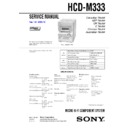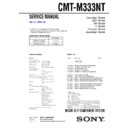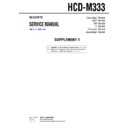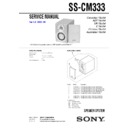Sony CMT-M333NT / HCD-M333 Service Manual ▷ View online
HCD-M333
MICRO HI-FI COMPONENT SYSTEM
SPECIFICATIONS
HCD-M333 is the Amplifier, CD player, MD
deck, Tape player and Tuner section in
CMT-M333NT.
deck, Tape player and Tuner section in
CMT-M333NT.
Model Name Using Similar Mechanism
NEW
CD Mechanism Type
CDM55A-30BBD61B
Base Unit Type
BU-30BBD61B
Optical Pick-up Type
A-MAX. 3
Model Name Using Similar Mechanism
HCD-CP505
MD Mechanism Type
MDM-7S2D
Optical Pick-up Type
KMS-262E
Model Name Using Similar Mechanism
NEW
Tape Transport Mechanism Type
CMAL1Z-236A
CD
Section
MD
Section
Tape deck
Section
9-877-180-09
2009L05-1
© 2009.12
Ver. 1.8 2009.12
SERVICE MANUAL
Sony Corporation
Audio&Video Business Group
Published by Sony Techno Create Corporation
Amplifier section
European model:
DIN power output (rated): 20 + 20 W
DIN power output (rated): 20 + 20 W
(6 ohms at 1 kHz, DIN)
Continuous RMS power output (reference):
25 + 25 W
(6 ohms at 1 kHz, 10%
THD)
(6 ohms at 1 kHz, 10%
THD)
Music power output (reference):
45 + 45 W
Other models:
DIN power output:
DIN power output:
20 + 20 W
(6 ohms at 1 kHz, DIN)
(6 ohms at 1 kHz, DIN)
Continuous RMS power output (reference):
25 + 25 W
(6 ohms at 1 kHz, 10%
THD)
(6 ohms at 1 kHz, 10%
THD)
Inputs
ANALOG IN:
ANALOG IN:
Sensitivity 250 mV,
impedance 47 kilohms
impedance 47 kilohms
DIGITAL OPTICAL IN (supported sampling
frequencies: 32 kHz, 44.1 kHz and 48 kHz)
Outputs
PHONES (stereo minijack):
frequencies: 32 kHz, 44.1 kHz and 48 kHz)
Outputs
PHONES (stereo minijack):
accepts headphones with
an impedance of 8 ohms or
an impedance of 8 ohms or
more
SPEAKER:
accepts impedance of 6 to
16 ohms
16 ohms
CD player section
Laser
Semiconductor laser
(CD:
(CD:
λ
=780 nm)
Emission duration:
continuous
continuous
Frequency response
2 Hz – 20 kHz
MD deck section
System
Minidisc digital audio
system
system
Laser
Semiconductor laser
(
(
λ
=780 nm)
Emission duration:
continuous
continuous
Sampling frequency
44.1 kHz
Frequency response
5 Hz – 20 kHz
Tape deck section
Recording system
4-track 2-channel stereo
Frequency response
60 – 10,000 Hz (
±
3 dB),
using Sony TYPE I
cassettes
cassettes
Canadian model:
Continuous RMS power output (reference):
Continuous RMS power output (reference):
25 + 25 W
(6 ohms at 1 kHz, 10%
THD)
(6 ohms at 1 kHz, 10%
THD)
Total harmonic distortion less than 0.09%
(6 ohms at 1 kHz, 6 W)
Photo : SILVER TYPE
US and foreign pafents lisensed from Dolby
Labaratories.
Labaratories.
— Continued on next page —
Canadian Model
AEP Model
UK Model
E Model
Chinese Model
Australian Model
2
HCD-M333
Tuner section
FM stereo, FM/AM superheterodyne tuner
FM tuner section
Tuning range
87.5 – 108.0 MHz
(50 kHz step)
(50 kHz step)
Aerial
FM lead aerial
Aerial terminals
75 ohms unbalanced
Intermediate frequency
10.7 MHz
AM tuner section
Tuning range
European model:
531 – 1,602 kHz
(with the tuning interval
set at 9 kHz)
(with the tuning interval
set at 9 kHz)
Other models:
530 – 1,710 kHz
(with the tuning interval
set at 10 kHz)
531 – 1,602 kHz
(with the tuning interval
set at 9 kHz)
(with the tuning interval
set at 10 kHz)
531 – 1,602 kHz
(with the tuning interval
set at 9 kHz)
Aerial
AM loop aerial, external
aerial terminal
aerial terminal
Intermediate frequency
450 kHz
General
Power requirements
European model:
230 V AC, 50/60 Hz
Other models:
220 – 240 V AC, 50/60 Hz
Power consumption
European model:
European model:
65 W
0.3 W or less (in Power
Saving mode)
0.3 W or less (in Power
Saving mode)
Other models:
65 W
Dimensions (w/h/d) incl. projecting parts and controls
Amplifier/Tuner/Tape/MD/CD section:
Amplifier/Tuner/Tape/MD/CD section:
mm
Mass
Amplifier/Tuner/Tape/MD/CD section:
Amplifier/Tuner/Tape/MD/CD section:
Approx. 5.6 kg
Design and specifications are subject to change
without notice.
without notice.
North American model:
87.5 – 108.0 MHz
(100 kHz step)
(100 kHz step)
Other models:
Pan-American model:
530 – 1,710 kHz
(with the tuning interval
set at 10 kHz)
531 – 1,710 kHz
(with the tuning interval
set at 9 kHz)
(with the tuning interval
set at 10 kHz)
531 – 1,710 kHz
(with the tuning interval
set at 9 kHz)
North American model:
120 V AC, 60 Hz
Korean model:
220 V AC, 60 Hz
Approx. 160
×
217
×
345
This appliance is
classified as a CLASS 1
LASER product. This
label is located on the
rear exterior.
classified as a CLASS 1
LASER product. This
label is located on the
rear exterior.
NOTES ON HANDLING THE OPTICAL PICK-UP
BLOCK OR BASE UNIT
BLOCK OR BASE UNIT
The laser diode in the optical pick-up block may suffer electrostatic
break-down because of the potential difference generated by the
charged electrostatic load, etc. on clothing and the human body.
During repair, pay attention to electrostatic break-down and also
use the procedure in the printed matter which is included in the
repair parts.
The flexible board is easily damaged and should be handled with
care.
break-down because of the potential difference generated by the
charged electrostatic load, etc. on clothing and the human body.
During repair, pay attention to electrostatic break-down and also
use the procedure in the printed matter which is included in the
repair parts.
The flexible board is easily damaged and should be handled with
care.
FOR CD
NOTES ON LASER DIODE EMISSION CHECK
The laser beam on this model is concentrated so as to be focused on
the disc reflective surface by the objective lens in the optical pick-
up block. Therefore, when checking the laser diode emission,
observe from more than 30 cm away from the objective lens.
the disc reflective surface by the objective lens in the optical pick-
up block. Therefore, when checking the laser diode emission,
observe from more than 30 cm away from the objective lens.
FOR MD
NOTES ON LASER DIODE EMISSION CHECK
Never look into the laser diode emission from right above when
checking it for adjustment. It is feared that you will lose your sight.
checking it for adjustment. It is feared that you will lose your sight.
CAUTION
Use of controls or adjustments or performance of procedures
other than those specified herein may result in hazardous radiation
exposure.
other than those specified herein may result in hazardous radiation
exposure.
Notes on chip component replacement
• Never reuse a disconnected chip component.
• Notice that the minus side of a tantalum capacitor may be
• Notice that the minus side of a tantalum capacitor may be
damaged by heat.
Unleaded solder
Boards requiring use of unleaded solder are printed with the lead-
free mark (LF) indicating the solder contains no lead.
(Caution: Some printed circuit boards may not come printed with
the lead free mark due to their particular size.)
free mark (LF) indicating the solder contains no lead.
(Caution: Some printed circuit boards may not come printed with
the lead free mark due to their particular size.)
The following caution label is located inside the apparatus.
Laser component in this product is capable
of emitting radiation exceeding the limit for
Class 1.
of emitting radiation exceeding the limit for
Class 1.
Flexible Circuit Board Repairing
• Keep the temperature of the soldering iron around 270 ˚C dur-
ing repairing.
• Do not touch the soldering iron on the same conductor of the
circuit board (within 3 times).
• Be careful not to apply force on the conductor when soldering
or unsoldering.
Ver 1.1 2003.05
3
HCD-M333
1. SERVICING NOTES
······················································· 9
2. GENERAL
········································································ 14
3. DISASSEMBLY
······························································ 16
3-1.
Top Panel Section ······················································· 17
3-2.
Cassette Mechanism Deck ········································· 18
3-3.
Front Panel Section ···················································· 18
3-4.
PANEL Board, H/P Board, LED Board ····················· 19
3-5.
Back Panel Section ····················································· 20
3-6.
MAIN Board ······························································ 20
3-7.
MD Mechanism Deck (MDM-7S2D) ························ 21
3-8.
MD DIGITAL Board ·················································· 21
3-9.
Holder Assy ································································ 22
3-10. BD (MD) Board ························································· 22
3-11. Motor Section ····························································· 23
3-12. Over Write Head (HR901) ········································· 23
3-13. Mini Disc Device (KMS-262E) ································· 24
3-14. POWER Board, Tuner (FM/AM) ······························· 24
3-15. REG Board, AMP Board ············································ 25
3-16. TRANS Board ···························································· 25
3-17. CD Mechanism Deck (CDM55A-30BBD61B) ········· 26
3-18. Cam (CDM55) ··························································· 26
3-19. Base Unit (BU-30BBD61B) ······································ 27
3-20. Optical Pick Up (BU-30B Assy) ································ 27
3-11. Motor Section ····························································· 23
3-12. Over Write Head (HR901) ········································· 23
3-13. Mini Disc Device (KMS-262E) ································· 24
3-14. POWER Board, Tuner (FM/AM) ······························· 24
3-15. REG Board, AMP Board ············································ 25
3-16. TRANS Board ···························································· 25
3-17. CD Mechanism Deck (CDM55A-30BBD61B) ········· 26
3-18. Cam (CDM55) ··························································· 26
3-19. Base Unit (BU-30BBD61B) ······································ 27
3-20. Optical Pick Up (BU-30B Assy) ································ 27
4. TEST MODE
···································································· 28
5. ELECTRICAL ADJUSTMENTS
TAPE SECTION ·································································· 33
CD SECTION ······································································ 35
MD SECTION ····································································· 36
CD SECTION ······································································ 35
MD SECTION ····································································· 36
6. DIAGRAMS
······································································ 44
6-1.
Circuit Boards Location ············································· 47
6-2.
Block Diagrams
– CD Section – ··························································· 48
– MD Section – ·························································· 49
– USB Section – ························································· 50
– MAIN Section – ······················································ 51
– CD Section – ··························································· 48
– MD Section – ·························································· 49
– USB Section – ························································· 50
– MAIN Section – ······················································ 51
TABLE OF CONTENTS
6-3.
Printed Wiring Board – BD (CD) Board – ················· 52
6-4.
Schematic Diagram – BD (CD) Board – ··················· 53
6-5.
Printed Wiring Board – BD (MD) Board – ················ 54
6-6.
Schematic Diagram – BD (MD) Board (1/2) – ·········· 55
6-7.
Schematic Diagram – BD (MD) Board (2/2) – ·········· 56
6-8.
Printed Wiring Board – MD DIGITAL Board – ········ 57
6-9.
Schematic Diagram – MD DIGITAL Board (1/2) – ·· 58
6-10. Schematic Diagram – MD DIGITAL Board (2/2) – ·· 59
6-11. Printed Wiring Board – TC Board – ·························· 60
6-12. Schematic Diagram – TC Board – ····························· 61
6-13. Printed Wiring Board – MAIN Section – ··················· 62
6-14. Schematic Diagram – MAIN Section (1/2) – ············· 63
6-15. Schematic Diagram – MAIN Section (2/2) – ············· 64
6-16. Printed Wiring Board – H/P Board – ························· 65
6-17. Schematic Diagram – H/P Board – ···························· 66
6-18. Printed Wiring Board – PANEL Section – ················· 67
6-19. Schematic Diagram – PANEL Section – ···················· 68
6-20. Printed Wiring Board
6-11. Printed Wiring Board – TC Board – ·························· 60
6-12. Schematic Diagram – TC Board – ····························· 61
6-13. Printed Wiring Board – MAIN Section – ··················· 62
6-14. Schematic Diagram – MAIN Section (1/2) – ············· 63
6-15. Schematic Diagram – MAIN Section (2/2) – ············· 64
6-16. Printed Wiring Board – H/P Board – ························· 65
6-17. Schematic Diagram – H/P Board – ···························· 66
6-18. Printed Wiring Board – PANEL Section – ················· 67
6-19. Schematic Diagram – PANEL Section – ···················· 68
6-20. Printed Wiring Board
– REG Board / TRANS Board – ································ 69
6-21. Schematic Diagram – REG Board / TRANS Board – 70
6-22. Printed Wiring Board – AMP Board – ······················· 71
6-23. Schematic Diagram – AMP Board – ·························· 72
6-24. Printed Wiring Board – POWER Board – ·················· 73
6-25. Schematic Diagram – POWER Board – ···················· 74
6-26. IC Block Diagrams ····················································· 75
6-27. IC Pin Function Description ······································ 84
6-22. Printed Wiring Board – AMP Board – ······················· 71
6-23. Schematic Diagram – AMP Board – ·························· 72
6-24. Printed Wiring Board – POWER Board – ·················· 73
6-25. Schematic Diagram – POWER Board – ···················· 74
6-26. IC Block Diagrams ····················································· 75
6-27. IC Pin Function Description ······································ 84
7. EXPLODED VIEWS
7-1.
Overall Section ··························································· 90
7-2.
Front Panel Section ···················································· 91
7-3.
Back Panel Section ····················································· 92
7-4.
MD Mechanism Deck Section-1 (MDM-7S2D) ········ 93
7-5.
MD Mechanism Deck Section-2 (MDM-7S2D) ········ 94
7-6.
CD Mechanism Deck Section-1
(CDM55A-30BBD61B) ············································· 95
(CDM55A-30BBD61B) ············································· 95
7-7.
CD Mechanism Deck Section-2 (BU-30BBD61B) ··· 96
8. ELECTRICAL PARTS LIST
······································· 97
Ver. 1.7
SAFETY-RELATED COMPONENT WARNING!!
COMPONENTS IDENTIFIED BY MARK
0
OR DOTTED LINE
WITH MARK
0
ON THE SCHEMATIC DIAGRAMS AND IN
THE PARTS LIST ARE CRITICAL TO SAFE OPERATION.
REPLACE THESE COMPONENTS WITH SONY PARTS WHOSE
PART NUMBERS APPEAR AS SHOWN IN THIS MANUAL OR
IN SUPPLEMENTS PUBLISHED BY SONY.
REPLACE THESE COMPONENTS WITH SONY PARTS WHOSE
PART NUMBERS APPEAR AS SHOWN IN THIS MANUAL OR
IN SUPPLEMENTS PUBLISHED BY SONY.
ATTENTION AU COMPOSANT AYANT RAPPORT
À LA SÉCURITÉ!
LES COMPOSANTS IDENTIFIÉS PAR UNE MARQUE
0
SUR
LES DIAGRAMMES SCHÉMATIQUES ET LA LISTE DES
PIÈCES SONT CRITIQUES POUR LA SÉCURITÉ DE
FONCTIONNEMENT. NE REMPLACER CES COM- POSANTS
QUE PAR DES PIÈCES SONY DONT LES NUMÉROS SONT
DONNÉS DANS CE MANUEL OU DANS LES SUPPLÉMENTS
PUBLIÉS PAR SONY.
PIÈCES SONT CRITIQUES POUR LA SÉCURITÉ DE
FONCTIONNEMENT. NE REMPLACER CES COM- POSANTS
QUE PAR DES PIÈCES SONY DONT LES NUMÉROS SONT
DONNÉS DANS CE MANUEL OU DANS LES SUPPLÉMENTS
PUBLIÉS PAR SONY.
UNLEADED SOLDER
Boards requiring use of unleaded solder are printed with the lead-
free mark (LF) indicating the solder contains no lead.
(Caution: Some printed circuit boards may not come printed with
free mark (LF) indicating the solder contains no lead.
(Caution: Some printed circuit boards may not come printed with
the lead free mark due to their particular size)
: LEAD FREE MARK
Unleaded solder has the following characteristics.
•
Unleaded solder melts at a temperature about 40
°
C higher
than ordinary solder.
Ordinary soldering irons can be used but the iron tip has to be
applied to the solder joint for a slightly longer time.
Soldering irons using a temperature regulator should be set to
about 350
Ordinary soldering irons can be used but the iron tip has to be
applied to the solder joint for a slightly longer time.
Soldering irons using a temperature regulator should be set to
about 350
°
C.
Caution: The printed pattern (copper foil) may peel away if
the heated tip is applied for too long, so be careful!
•
Strong viscosity
Unleaded solder is more viscous (sticky, less prone to flow)
than ordinary solder so use caution not to let solder bridges
occur such as on IC pins, etc.
Unleaded solder is more viscous (sticky, less prone to flow)
than ordinary solder so use caution not to let solder bridges
occur such as on IC pins, etc.
•
Usable with ordinary solder
It is best to use only unleaded solder but unleaded solder may
also be added to ordinary solder.
It is best to use only unleaded solder but unleaded solder may
also be added to ordinary solder.
4
HCD-M333
This system has a Self-diagnosis display
function to let you know if there is a system
malfunction. The display shows a code made up
of three or five letters and a message alternately
to show you the problem. To solve the problem
refer to the following list. If any problem
persists, consult your nearest Sony dealer.
function to let you know if there is a system
malfunction. The display shows a code made up
of three or five letters and a message alternately
to show you the problem. To solve the problem
refer to the following list. If any problem
persists, consult your nearest Sony dealer.
C11/Protected
The MD is protected against erasure.
c Remove the MD and slide the tab to close the slot
(page 15).
C12/Cannot Copy
You tried to record a CD with a format that the
system does not support, such as a CD-ROM.
system does not support, such as a CD-ROM.
c Remove the disc and turn off the system once,
then turn it on again.
C13/REC Error
Recording could not be performed properly.
c Move the system to a stable place, and start
recording over from the beginning.
The MD is dirty or scratched, or the MD does not
meet the standards.
meet the standards.
c Replace the MD and start recording over from the
beginning.
C13/Read Error
The MD deck cannot read the disc information
properly.
properly.
c Remove the MD once, then insert it again.
C14/TOC Error
The MD deck cannot read the disc information
properly.
properly.
c Replace the MD.
c Erase all the recorded contents of the MD using
the All Erase Function (page 29).
Self-diagnosis display
C41/Cannot Copy
The sound source is a copy of a commercially
available music software or CD-R.
available music software or CD-R.
c
The Serial Copy Management System prevents
making a digital copy (page 64). In addition, you
cannot copy from a CD-R.
making a digital copy (page 64). In addition, you
cannot copy from a CD-R.
C71/Check OPT-IN
No component is connected to the DIGITAL
OPTICAL IN jack, or you tried to record from th e
digital component which is not connected correctly.
OPTICAL IN jack, or you tried to record from th e
digital component which is not connected correctly.
c
Connect the optional digital component correctly
to the DIGITAL OPTICAL IN jack using the
digital optical cable (not supplied) (page 52).
to the DIGITAL OPTICAL IN jack using the
digital optical cable (not supplied) (page 52).
The power of the connected component is not turned
on.
on.
c
Check if the power of the connected digital
component is on. Refer to the operating
instructions supplied with the component.
component is on. Refer to the operating
instructions supplied with the component.
The digital optical cable is disconnected, or the
power of the connected component is turned off
while recording the digital audio from the
component connected to the DIGITAL OPTICAL
IN jack.
power of the connected component is turned off
while recording the digital audio from the
component connected to the DIGITAL OPTICAL
IN jack.
c
Connect the digital optical cable, or turn on the
power of the connected component.
power of the connected component.
E0001/MEMORY NG
The component has internal problem.
c
Consult your nearest Sony dealer.
E0101/LASER NG
There is a problem with the laser pickup.
c
The laser pickup may be damaged. Consult your
nearest Sony dealer.
nearest Sony dealer.
E0201/LOADING NG
There is a problem with loading.
c
Consult your nearest Sony dealer.




